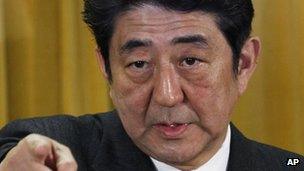New Year messages from Japan
- Published
- comments

Only in Japan could the re-election of a party that has run the country for 53 of the last 57 years be greeted by global financial markets as a breath of fresh air.
But that is how the Liberal Democratic Party's landslide victory is being interpreted by global investors, if not Japanese voters themselves.
Everyone expects Shinzo Abe to spend yet more money the government doesn't have, and to pressure the Bank of Japan into spending trillions more as well - in a desperate bid to push up prices and finally reflate the economy.
There aren't many economists I speak to who think, with all of Japan's structural problems, that Mr Abe's two pronged stimulus programme will deliver lasting economic growth. But international investors do seem to think he will succeed in pushing down the value of Japan's currency.
Why does this matter for anyone outside Japan? It matters because it highlights three big themes for the global economy that I suspect we will keep coming back to in 2013. They are: central bank activism; competitive depreciation; and, for the umpteenth time, the great challenge of achieving decent growth in advanced economies laden with private and public debt.
Inflation pledge
I won't dwell on the central bank activism - I've said a lot on that subject in my last two posts. But it should be said that Mr Abe had put a rethink of national monetary policy front and centre of his election campaign, long long before it became a hot topic in the US and UK.
As well as proposing a lot more old-style deficit spending on public works and the like, the soon-to-be Japanese prime minister campaigned on a pledge to raise the Bank of Japan's inflation target to from 1% to 2%, insisting there should be unlimited monetary stimulus until that target is reached.
If that sounds odd to you, remember that Japan is a country which has had falling prices, of and on, for years. Consumer prices fell almost continuously between 2009 and 2011, and most forecasters expect the inflation rate to be negative in 2013 as well.
The idea behind this, roughly similar to the Carney argument for a nominal GDP target, is that the only way to stimulate activity, in a deeply deflationary environment is to convince people and businesses that you really will spend whatever it takes to ensure that prices and nominal demand will be higher next year than they are today. So, in theory, businesses and individuals will finally decide to spend and invest.
Mr Abe threatened to revoke the central bank's independence, if necessary, to achieve all this. But he might not have to, given that the current Governor, Masaaki Shirakawa, finishes his current term in April, and his two deputy governors are up for renewal as well.
One front-runner to replace Mr Shirakawa is Kazumasa Iwata, the president of a respected economic think tank who has talked previously about setting up a 50tn ($596bn; £368bn) fund to buy foreign government bonds in a bid to force down the value of the yen.
We know central banks can debauch their own currencies on the exchange markets, even if the depressed state of the domestic economy makes them unable to reliably produce inflation or decent economic growth at home. But we also know that such a strategy is not necessarily going to do down well with the rest of the world at a time when many other countries are dealing with the same problem.
Currency battles
That brings me to the second theme for 2013: which is competitive depreciation.
We talked a lot about "global currency wars" in 2010". If things don't go well for the global economy in the first half of next year, I suspect we could hear about it again in 2013.
If you look at the growth strategy of nearly every major economic region next year (with the partial exception of the US), it relies more than ever on the support of exports.
Put it another way, many countries are once again hoping to borrow from other nations the demand they cannot generate at home. We know, by the laws of arithmetic, that at least some of them are likely to be disappointed.
Which brings us to the third theme from this election in Japan - unfortunately the same one that Japan has been teaching us (if we bothered to pay attention) since the 1990s. That painfully obvious but important lesson is that growing your way out of the debt-ridden aftermath of a financial crisis is really, really hard. And when political elites cannot deliver deep-seated structural reforms, it is more of less impossible.
The stock market rose by nearly 2% on the election result, but as Carl Weinberg of High Frequency Economics points out, Japanese stocks are still at barely 20% of the level they were at in 1989. Industrial output and employment are back to where they were 22 years ago. And the stock of public debt stands at 230% of GDP.
The rest of the world has tolerated Japan's efforts to push down its exchange rate in past years, out of sympathy for its exceptionally sorry plight. But the more their own situation starts to resemble Japan's, the less sympathetic its Western trading partners may become.